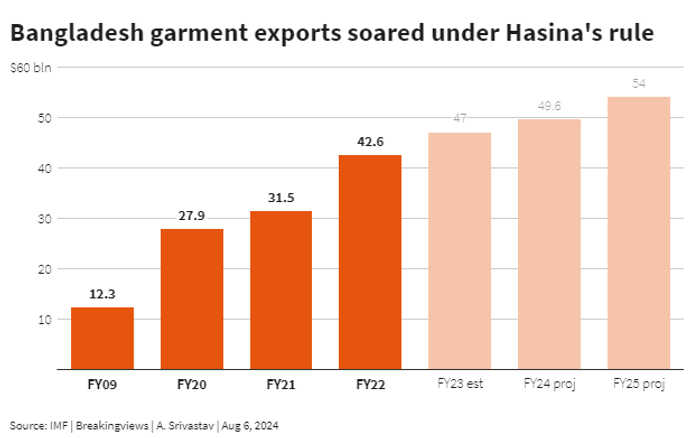Published 12:14 IST, August 6th 2024
Bangladesh becomes global firms’ next big unknown
Ready-made garments will account for 90% of its $55 billion of annual exports in FY2024, as per International Monetary Fund.
- Opinion
- 3 min read

Rough spin. Global firms can add Bangladesh to their growing list of big unknowns. Protests may ease now Prime Minister Sheikh Hasina has resigned and fled the South Asian country home to 170 million people. But her extraordinary ousting on Monday following 15 years of iron-fist rule leaves multinational firms, not least those in the clothing industry, with a lot to worry about.
Shareholders of fast-fashion retailers took Hasina’s departure in their stride. H&M sources from about 1,000 factories from the world’s third-largest exporter of clothing and said it was "concerned" about the developments in Bangladesh. Yet its stock and that of Levi Strauss and Zara-owner Inditex fell barely 1% on Monday, even amid a broader, unrelated global sell-off in equities.

Activity at factories had already been disrupted after a weeks-long crackdown on student-led protests over job-quotas left hundreds of people dead. Investors will also hope Bangladesh’s high dependence on its textile industry provides an incentive to ensure any continuing disruptions are temporary: ready-made garments will account for 90% of its $55 billion of annual exports in the financial year 2024, according to International Monetary Fund estimates.
The initial signs of what comes next appear encouraging for foreign investors: The army pledges there will be an interim government, and some protesters are calling for Nobel Peace Prize laureate Muhammad Yunus to be its chief adviser. The banker and economist is well placed to help Bangladesh stabilise remittances, tackle a jobs crisis and tame inflation currently running at around 10%. Yet elections will have to follow sooner or later, and Yunus’ previous efforts to enter politics fell flat.
That leaves a lot of uncertainty over the long-term outlook. Hasina turned Bangladesh into one of the fastest-growing economies in the world, but her Awami League ruled over an increasingly one-sided democracy. The main opposition Bangladesh Nationalist Party has boycotted national elections, and last week she outright banned the Jamaat-e-Islami that was barred for over a decade from participating in polls.
Though Washington was critical of the way Hasina ruled, she was widely seen as having a firm hand on radical Islamists and a strong ally for neighbour India. Her departure also provides China an opportunity to increase its influence in Bangladesh through its Belt and Road infrastructure projects.
Global firms have a high tolerance for political earthquakes in emerging markets and are grappling with a growing list of supply-chain headaches around the world. Even so, Bangladesh offers fresh unknowns that could yet send them into a spin.
Updated 19:07 IST, August 6th 2024